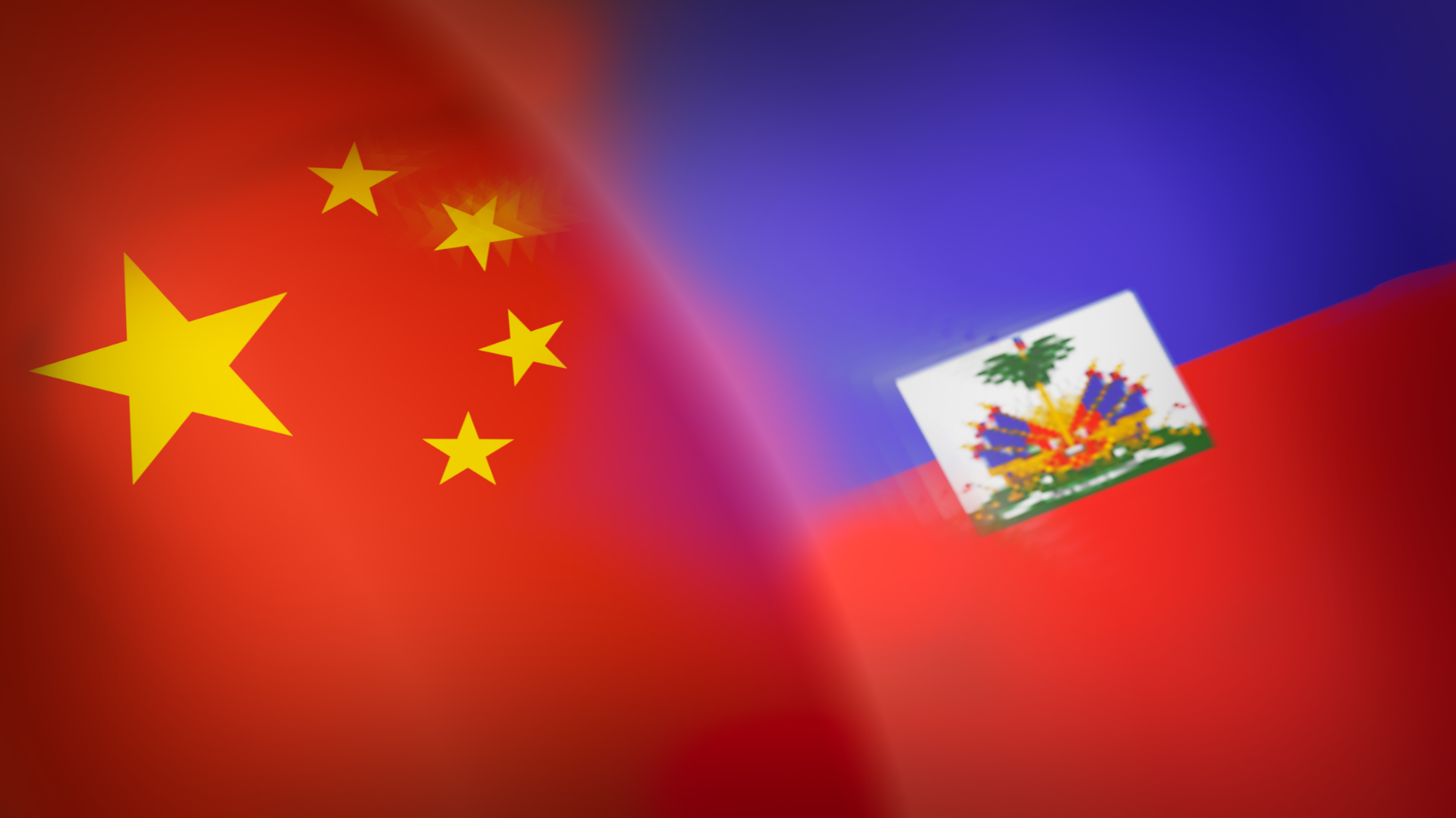In this blog, I will be listing the references and links associated with my research and interesting findings. Some links will be blogs, archives, articles, and other sources that relate to the topic of my research or are generally associated with Haiti. This post will be a special accumulation of sources for those interested in learning more or filling in gaps others were not able to do.
https://en.wikipedia.org/wiki/Chinese_Haitians
Wikipedia! Usually frowned down upon by professors and other scholars due to the nature of the website, the information provided on this page however, was my starting point. This link was my very first source before I needed to redirect the way I searched for information. The information on this page was repetitive across many websites which discouraged me a little. However, because of this website, I was forced to re-analyze my strategies when looking for information regarding Chinese Haitians.
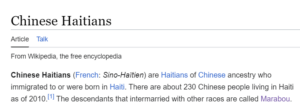
https://en.wikipedia.org/wiki/Haiti%E2%80%93Taiwan_relations
As mentioned before, Wikipedia is not the greatest website for citing your data. However, it is a great beginning source that outlines the information that is out there. This page discusses the relationship between Haiti and Taiwan. It’s a way to begin your research if interested in governmental affiliation between Haiti and Taiwan.
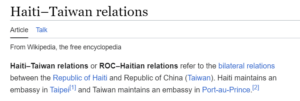
https://www.familysearch.org/en/wiki/Chinese_in_the_Caribbean
This websites lists the many places the Chinese has migrated to within the Caribbean.

https://fondaskreyol.org/article/the-untold-story-of-chinese-haitians
This was the second website I found before I stopped looking for results using words such as ‘Chinese Haitians’ or ‘Chinese in Haiti’. In this blog, the author discusses the reasons why there aren’t many Chinese descendants residing in Haiti today. One of the few things I took away from this blog was that Haiti also shared anti-foreigner propaganda as many countries do today. Here is a snippet of the blog:

This brings me to a snippet I saw while going through the Haiti Sun newspaper archives – archives which are housed in the George A. Smathers Library, University of Florida, and which the author of the subsequent blog utilized beautifully. According to some of these newspaper articles from 1950 to 1962, Haiti has been praised and advertised as a country to visit. Were these advertisements targeting tourists or immigrants such as Chinese Haitians who no longer wished to continue living in Haiti?

(Haiti Sun Newspaper, March 13, 1955)
(https://ufdc.ufl.edu/AA00015023/00331/thumbs)
https://thedreamvariation.blogspot.com/2019/08/the-history-of-chinese-in-haiti_15.html
Whoever the author of this blog is, DID, THEIR, WORK. I commend them for taking the time to look for lost sources. They acknowledged the gap for the underrepresented and made it their duty to fill some of it themselves. The blog’s author was someone I referred to as a ‘gem’ when speaking to my professor about the resources I have collected. However, because of this blog, my initial goal was shifted because now that this page exists, something I would like to do myself already exists. I now had to brainstorm ways I could contribute to further close the gaps without seemingly copying from this creator and Kreyolicious. This blog covers many topics, such as possible reasons for the archival silences, and a discussion of the actual Chinese presence in the country. Below is a snippet of their work in case you, the reader or researcher, would like to know more.

https://reliefweb.int/report/haiti/china-contributes-haitis-reconstruction-after-natural-disasters
This website is a good source for seeking information regarding China’s participation after the earthquake. It describes the amount of aid provided, how it was provided and China’s plans moving forward. If you are looking for a resource that explains what China does for Haiti just for its views of Taiwan, this article is very useful demonstration of the two nations relationship. Here is a small snippet from the article that describes Haiti’s acceptance and admiration of China.

https://dloc.com/collections/ianh
This is a website that has all archives related to Haiti. If you require any official document related to the government or civil matters then this is the library you should look into. It’s not guaranteed that the information you material you seek will be there but I would take a look nonetheless. Although I am satisfied there is a library but begin to wonder what these officials deem to be important or left out. This source is another reason why it’s nice to think that Haiti’s only bookkeeping outlets and records are only limited and not completely unavailable. Many of the items are available because of universities such as the University of Florida.
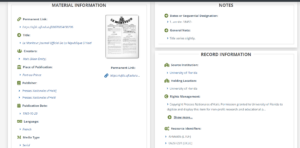
https://eastasiaforum.org/2019/07/23/caribbean-countries-turn-to-chinas-belt-and-road/
This is a forum that discusses the Belt and Road Initiative Project. They discuss the fears this project can cause and how it will benefit the countries involved. The authors of this forum explain China’s involvement and their strategies to help the countries that may have issues complying with the economic demand. This article also points out China’s dedication to helping Haiti join the Belt and Road Initiative Project. It also touches on the ‘tug and pull’ relation between the Caribbean and its dilemma in choosing which large nations, the United States or China, to align with.

https://www.cfr.org/backgrounder/chinas-massive-belt-and-road-initiative
This is another blog that discusses China’s Belt and Road Initiative Project. The authors of this article compare the project to the Silk Road. In comparison to the article above, this one thoroughly explains China’s objectives for the project and the strategic ways it will be accomplished. This is a good read if you want to understand the project alone and how China plans on executing the idea further with the help of other nations even if it means canceling debt. I appreciated the options it provided when deciding which section you would like to start from. I highly recommend reading this article.
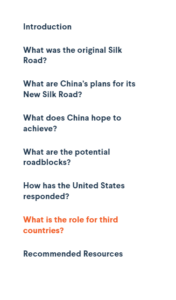
https://asiapacificcurriculum.ca/learning-module/chinese-migrations-mid-late-19th-century
This website discusses the migration of the Chinese from the mid to late 19th century. This website can provide insight on the reasons why many Chinese individuals may have settled in Haiti or the Caribbean. The article states declining governance, lack of employment opportunity, and internal upheaval are the prominent reasons for migration. The process of migration can take many forms depending on the period. According to the Asian Pacific curriculum, two of the major migrations were flight and economic migration. The article’s author Jack Peter Hayes (n.d) states flight migration is when citizens wish to escape unsafe environments whether it is a crumbling dynasty, natural disasters, or diseases. Another is economic, which is similar to the migration of Chinese to Jamaica, the people are looking for a better financial predicament outside of what they were experiencing in China. The migrations are usually to places where the demand for labor workers is in high demand. The many waves of migration that occurred between China and Haiti all seem to be based on these two reasons. The most common waves of Chinese migration to be noted within all articles were the 19th-century migration out of China to other places such as Haiti and the post-2010 earthquake migration out of Haiti. Hayes (n.d) states that migration is also a family-oriented decision, where the men seek work to provide for their families who remained in China and the families rely on remittance. If the family was at a financial disadvantage and depended on these forms of payments and the breadwinner, the provider of the family would be expected to work long and hard to meet the dependent’s necessary demands. The demand for work and refuge are the two greatest reasons noted for the migration waves into the country. However, I wonder if these demands have decreased since the 19th century since the population in Haiti is still relatively small or if is there another country that fits these needs. If you would like to learn more about the migrations and reasons, this article is a great beginning source.

https://doi.org/10.1353/apr.2024.a928619.
This article discusses China’s participation in the UN Peacekeeping in regards to Haiti. it covers the relationship between China and Haiti as well as Taiwan and The United States. The topics that covered are limitations of China and its termination of the involvement. This is bias reading if you want to view the respective of China’s influence to aiding Haiti. I recommend reading if you are interested in the governmental relations between China and Haiti.
https://www.chinadaily.com.cn/world/2010-01/24/content_9367455.htm
The 2010 earthquake in Haiti was a tragic time for many people including those who aren’t originally from the island. This article discusses how the new wave of Chinese immigrants decided whether to stay and work or return home to China because they were afraid and did not know how to recover from this natural disaster. The article covers a few individuals and their stories when choosing whether to leave or stay in Haiti. You get the chance to read about China’s aid to Haiti and it’s people. You also get an insight to what the Chinese people initially thought once tragedy struck. Many weren’t expecting aid or did not know where to find it. There were those that did found it within their small community of fellow Asians in Haiti. This is also a great read in understanding what it’s like to be a foreigner when natural disasters or any unfortunate event occurs.
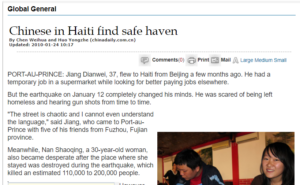
https://web.archive.org/web/20141112022641/http://www.ebeijing.gov.cn/BeijingInformation/BeijingNewsUpdate/t1100338.htm
This is another article that discusses the actions of Chinese people when the 2010 earthquake struck. It provides more stories of the Chinese people affected by the earthquake and how they received assistance. Similarly to the one posted above this, you get to read about the hope and aid provided by the community and China. Have a tissue on standby.

Tatiana Wah is a Haitian-Chinese author and Professor. She has taught at Columbia University. She is very active within the Haitian government and a member of the Haiti Research and Policy program. According to the website, She has a very interesting take on many policies and the state of Haiti, especially after the 2010 earthquake. I imagine if someone would like to know more about her work, easy research can help.

Other more prominent Haitian people with Chinese ancestry:
- Essud Fungcap, Artist: https://heritagesart.com/collections/fungcap-essud
- Edouard Wah, Artist: https://www.naderhaitianart.com/collections/wah-edouard/artists-wah-edouard
